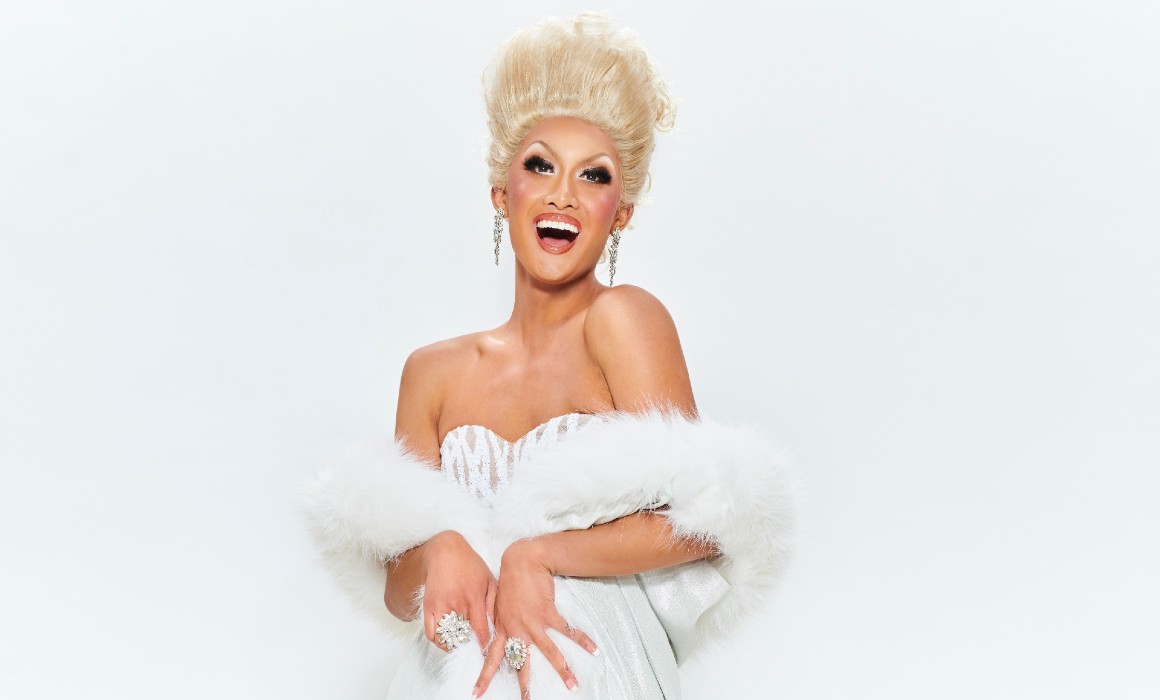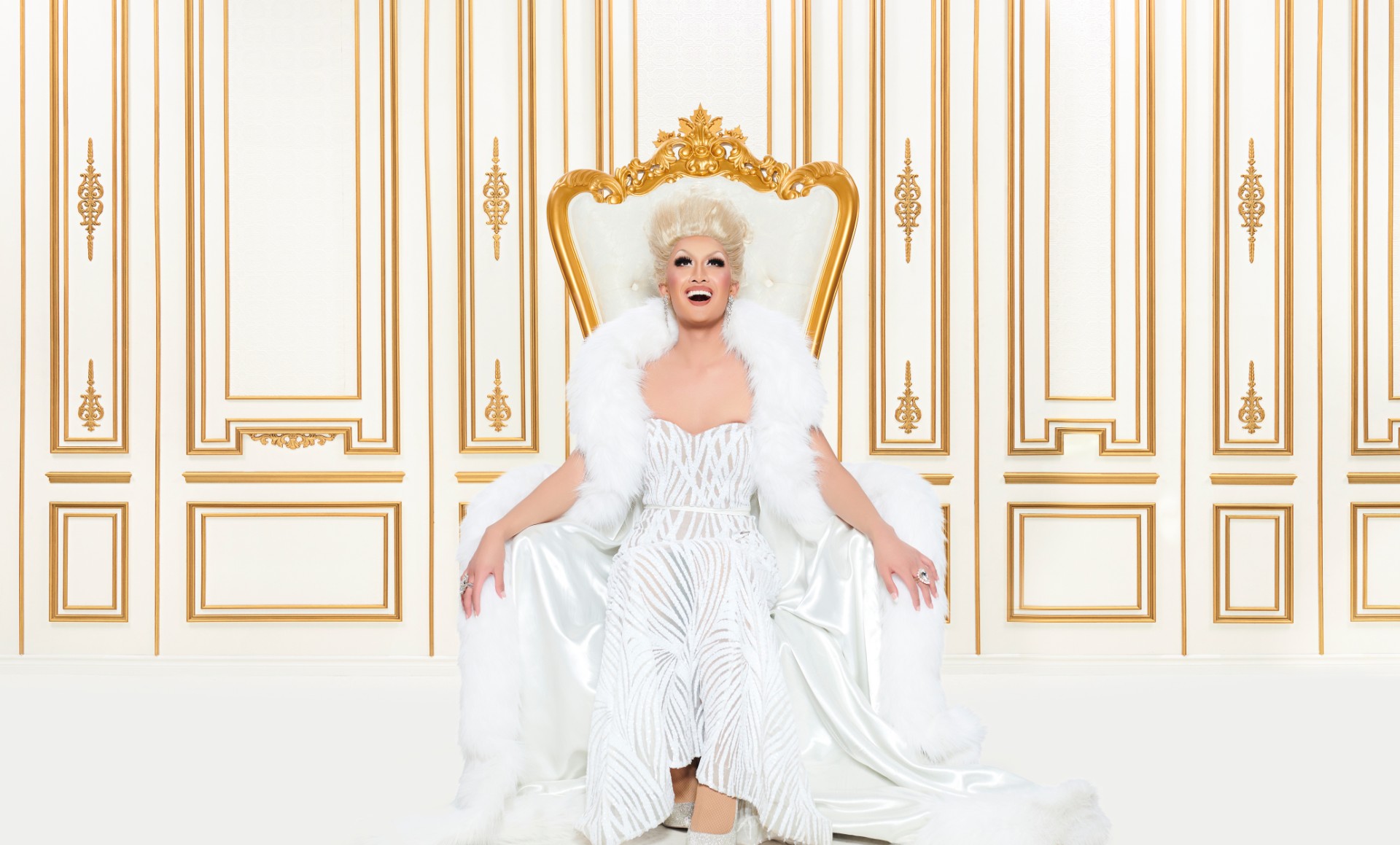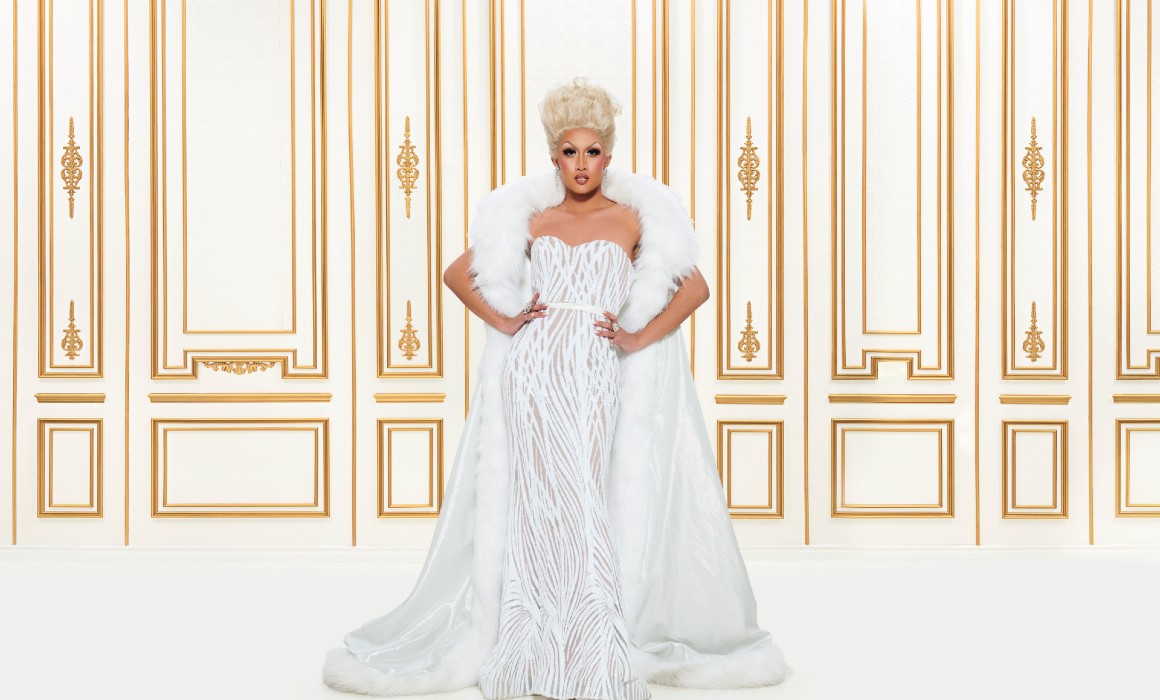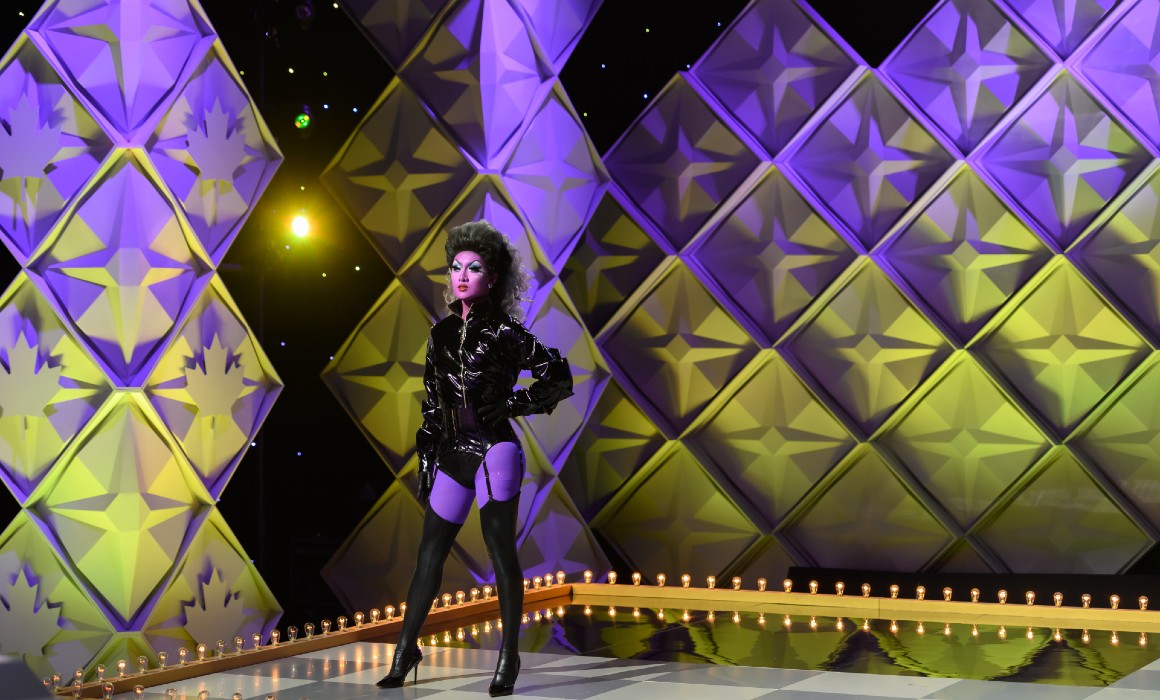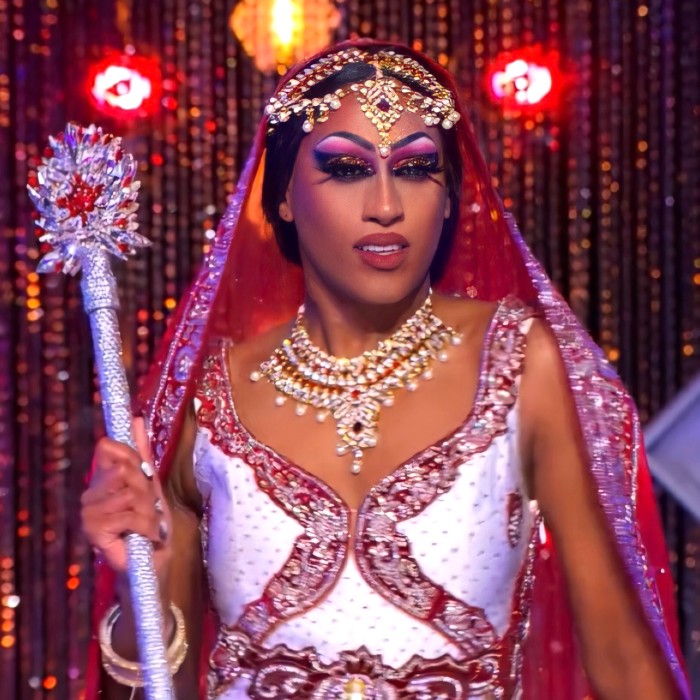Not going to lie, we were pretty disappointed when Kyne was eliminated during week two of the inaugural season of Canada’s Drag Race.
Sure, the Kitchener-based performer’s (and math major at the University of Waterloo) time on the show was slightly rocky due to her no-holds-barred rant towards fellow queen Boa in Untucked and unapologetically sassy quips to the judges, particularly Brooke Lynn Hytes. But despite Kyne being dubbed the “villain” of the show, we were rooting for the Filipina-Canadian social media queen, and were overall thrilled to see queer Asian representation on screen. And whether you love her or hate her, you can’t deny that Kyne is great representation for the Asian LGBTQ+ community — something she says she lacked when growing up.
Below, we chat to Kyne about the need for more queer Asian representation, dealing with the “villain” title and that controversial tweet on how white queens are treated differently than queens of colour.

First off, congratulations on being on the show! What was the experience like for you?
It was lots of fun. It was a huge eyeopener in many ways, I think overall it was something that I’ve been able to cross off my bucket list. It was a memory.
In what ways was it eye-opening?
I think eye-opening in the way of me coming to terms with my own shortcomings and abilities. Definitely being in front of a worldwide audience where I don’t have as much control as I have over my own social media was different, to say the least. But I guess I’ve learned just over the past few weeks to really roll with the punches. That’s sort of been the theme of this whole year, especially with coronavirus going on, this whole airing of the series has been totally different than how I thought it would be — I thought I’d be travelling, I thought I’d be doing shows, I thought people would like me more (laughs). So it’s all been eye-opening, a learning experience. But I wouldn’t change anything… it’s just a valuable lesson.
Let’s talk about people liking you more, because you were portrayed as a villain on the show. What are your thoughts on that, and how do you deal with the criticism that you receive when you’re portrayed that way?
I’m a very competitive person, I think people weren’t expecting to see that because I think people didn’t know that side of me. And I also have just a very dry sense of humour, I’m very sarcastic. Lots of people will just see that as very bitchy, but I think people who know me know that it’s all done in jest, all done as a laugh. I think I’ve had to just learn that there’s always going to be haters, there’s always going to be people who don’t like you, even the most beloved queens from the franchise have haters and trolls, I think I was giving them way too much attention in the first week after the first episode came out, I was really thrown by it, but I’ve sort’ve gotten back to just, you know, not giving a fuck.
How did you get into drag?
I started out just wearing some makeup as a boy, just wearing makeup in my day-to-day life when I was in high school because I had lots of acne problems. And I sort of just started falling in love with the artistry and the creativity of putting it on and playing with different colours that I really felt I had more positive attention…people wanted to talk to me more, they wanted to be my friend, which is probably very superficial but I think it also gave me the confidence. It helped me hold my head up high and walk with a purpose. I sort of perceived that feeling and I just chased that bout of confidence and the rush that it gave me, so I started putting on more makeup and I was like OK, maybe I should do lipstick and false lashes and wigs…that’s sort of how I sort of got drawn into doing drag.
And then the first time I saw a drag show in real life, I was like OK, this is it. They’re kind of doing something similar to what I’m doing, but on stage, with music, it’s just like the next level and I was like, ‘I need to do that.’
And you’re a musician too, right?
Well, not really (laughs). I’m a music lover, that’s what I would call myself. I used to play flute when I was in elementary school and I’ve tried to take that up again but I would not call myself a musician, I’m a music lover.
OK, but I saw that video when you were playing Billie Eilish! It was so good!
(Laughs). Thank you. It’s just a stupid little hobby of mine, I’m not very good!
OK, let’s talk about being an Asian drag queen. How has your cultural background affected your family or parents’ reaction to doing drag?
[My parents] were pretty accepting of me being gay, but the drag thing, they didn’t understand because they thought that it was me sort of falling into the stigma of being the very effeminate gay man with all the mannerisms of a gay man. They didn’t want me to have that stigma attached to myself because in our culture, we’re always the butt of the joke on TV, and they don’t want me to be the butt of the joke, they don’t want me to be bullied. So, it was one thing for me to be gay, but to be so feminine they felt would be something that would draw me back in life.
But, I think I was just so steadfast with doing what I wanted to do that they started coming around to it, they started seeing that drag was a creative outlet for me and that it was a form of being artistic and me being talented. Then as they saw me starting to get some accolades in it and me just really coming into who I am, it really made them turn around.
Do you have any advice for other Filipino kids who are gay or who want to get into drag who are having difficulty getting that acceptance from their parents?
It’s really tough, and everybody has different circumstances — I feel quite lucky with the family that I ended up with. I feel that if people are in a dangerous situation if their family is going to be more aggressive, then I think it’s not worth it to jeopardize their own safety. I think it further stresses the need for more queer representation and queer Asian representation in media because I want people’s parents’ to actually see gay people—gay Asian people—succeeding in life, being smart, being talented, being accomplished and not always being the butt of the joke.
Do you feel you saw that positive representation, especially queer Asian characters, in media growing up?
Not at all. I don’t think I ever watched any gay Asian people growing up, not when I was a kid. But throughout my years of doing YouTube, I guess my later teen years, I followed Patrick Starrr who I really loved and respect. He’s a gay Filipino man and seeing someone like him have such a successful career, it’s definitely inspired me and shown me that I can do whatever I set my mind to.
You also tweeted about how white queens get treated differently than queens of colour, especially when it comes to being confident on-screen. Why do you think that is?
I will admit, I was maybe playing it up a little bit when I was on the show. As I said, it is totally my sense of humour to be fully sarcastic and just joke around like that, but I remember in the moment thinking, ‘Well, this worked out well for lots of other queens’: Violet Chachki, The Vivienne, Aquaria…lots of other queens were able to come in and be very confident and go really far. So I thought that I was sort of setting myself up for this storyline of the sort of talented person who is very confident and just very self-adored and maybe a little bit cheeky with her sense of humour.
But I got so much backlash and messages from people saying I had such a sour attitude and that was disappointing, because when other queens talk back to the judges, and put the N in “charisma, uniqueness, nerve and talent”, fans live for it. You see Tammy Brown do it, Pearl do it….I just found that interesting.
You’ve also been using your platform online for math education, which is great, but also using it to talk about anti-Black racism. Can you explain why that’s important to you?
It’s important to me because I’m such a math lover, and I think that everybody can be math lovers and not only is math something that’s beautiful and elegant and worth learning about, just for the sake of it, but it’s also worth learning because math is used in the media to manipulate people and most people just don’t have a strong sense of what they’re reading whenever they see numbers in headlines. So, I think we have to equip people with the tools to be able to understand what the numbers mean whenever they see numbers and being able to dismantle graphs that are misleading, because we can’t just look at things on the surface level.
What can we expect next from you?
More math! I have lots of other interests that I would love to integrate more into my platform. You didn’t see any of my math on Drag Race and I still have stuff up my sleeve that not everyone has seen. I’m a very multi-dimensional person.
What do you hope to continue to bring to the drag world, and what type of legacy would you like to leave as an Asian queen?
I think I want to continue pushing the boundaries of what it means to be a drag queen and what it means to be a gay person in this world: That we are not a monolith, that we don’t all think the same, we don’t all act the same, we are people with a complex background and many different interests that go beyond the stage.
Follow Kyne on Instagram, Twitter, TikTok and YouTube.







